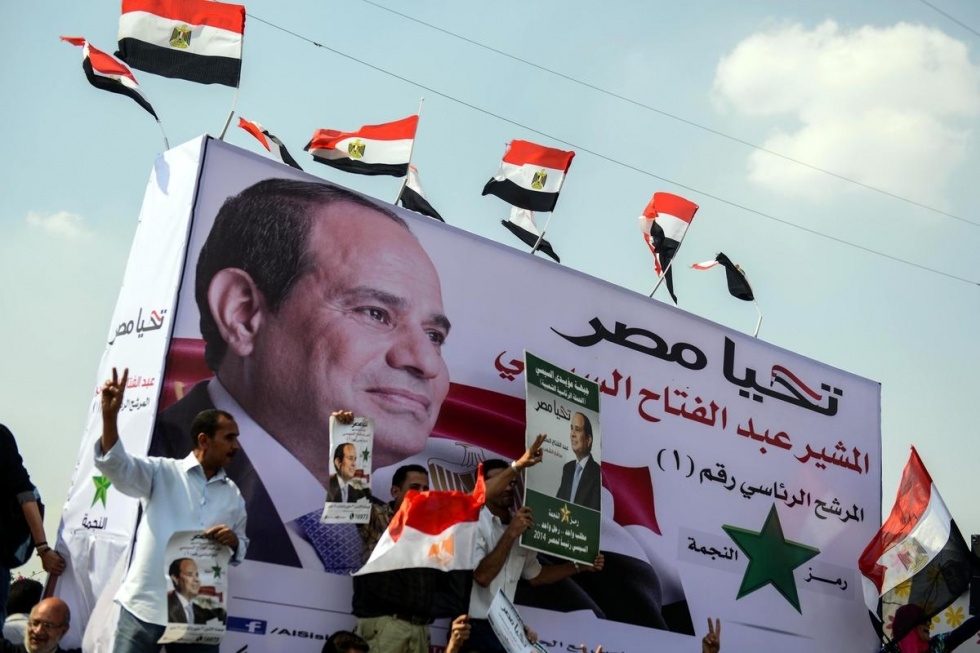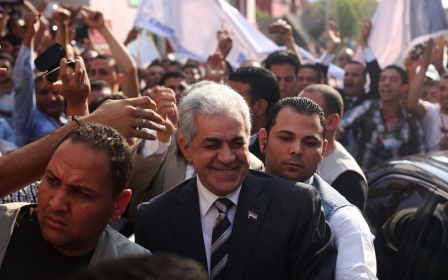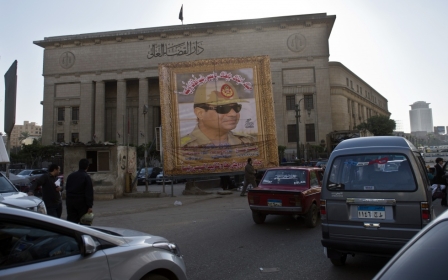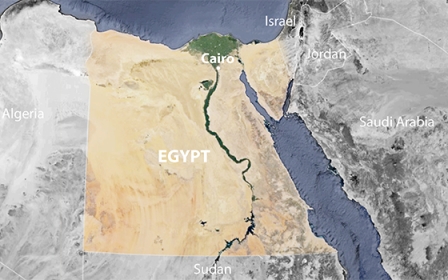Stability no nearer as Egypt elections loom

For the second time since longtime autocrat Hosni Mubarak was deposed on 11 February 2011, Egyptians will once again line up at the polling stations to elect a head of state this coming week. Unlike the presidential election of 2012, no one is likely to wait with bated breath on the results of this vote.
It’s looking somewhat reminiscent of the presidential election of 2005, when Mubarak handily defeated his two opponents, but with likely a higher margin of victory for the state’s candidate this time around, if the results of the expatriate vote are anything to go by.
The result should surprise no one; after all, former army chief and presidential candidate Abdel Fattah el-Sisi has already received the endorsement of the military, the paramount institution of the state, and has been fawned over in state and private media for many months, with his apparent lack of a detailed programme glossed over. The Muslim Brotherhood, his political opponents, has been driven underground by a relentless crackdown.
We can expect some triumphalism after the vote. The interim authorities have made much of the fact that they have abided - for the most part - by the roadmap unveiled on 8 July, with every step on that path feted as evidence of Egypt’s sure progress. This is irrespective of the fact that the roadmap’s milestones were the product of the deliberations of a minority of actors and interests, subject to no popular oversight, and which have been arguably void of all meaning by the backdrop against which they unfold: thousands of detainees, mass death sentences, the jailing of journalists, and a total lack of accountability for the worst mass killing in Egypt’s modern history.
Still, that train has, for all intents and purposes, left the station. It is more useful to consider what happens after Sisi receives the popular mandate he seeks.
New MEE newsletter: Jerusalem Dispatch
Sign up to get the latest insights and analysis on Israel-Palestine, alongside Turkey Unpacked and other MEE newsletters
Judging from his TV appearances, Sisi recognises that he needs time, around two years, if he’s to effect any sort of meaningful change in the average Egyptian’s life. But with current levels of instability in the country, Sisi might not have two years. To be clear, the protests are not currently at a level that can pose any imminent threat to the survival of the government.
But despite the repeated, oft-mocked assertions of parts of the protest movement that regime collapse is near, all indications are that the Brotherhood recognises that it is in this for the long haul, and has accordingly geared up for a drawn out war of attrition. Still heavily reliant on Gulf largesse, Sisi knows the clock is ticking, and that Egypt, on the economic front, is not on what anyone would describe as sure footing. Stability, as Sisi doubtless knows, is at a premium.
It is possible that Sisi will undertake token gestures of magnanimity, perhaps commuting some death sentences, or pardoning some fraction of Egypt’s sizeable population of political prisoners. With between 16,000 and 20,000 people in jail, Sisi can probably afford to release a few carefully screened hundreds without making a significant dent in the overall figure, and still be hailed as a reformer.
But we should not expect such initiatives to go very far. The government can probably ill-afford significant releases, given that these are likely to embolden a protest movement that has survived for 11 months, despite ruthless repression. Detainees who have been brutalised for their political or religious convictions may not choose to go home and lead a quiet life. They may, in fact, join the growing number of Islamists who’ve decided that the government must be resisted by force of arms.
However, if carefully calibrated, such concessions will benefit the incoming president, allowing the government to paint its opponents as intransigent if they fail to respond enthusiastically to the gesture. There is also a good possibility that such concessions will be latched on to by parts of the international community, eager to justify continuing support for a government engaged in systematic and widespread human rights abuses.
There also appears to be recognition of the need for some form of reconciliation. Egyptian human rights activist Saad Eddin Ibrahim has claimed that individuals close to Sisi indicate that he plans to unveil a proposal to that effect after the elections. And Helene Michou notes that EU Special Representative Bernardino Leon has stated that the EU is working on a reconciliation initiative to be unveiled after the elections. She is, however, rightly skeptical of any outside actor’s ability to lay the groundwork for a reconciliation process when there appears to be so little inclination towards that possibility on both sides. Likewise, it is unclear that it will be any easier for domestic actors to break out of the toxic dynamic that has characterised Egyptian politics and society for nearly a year. Note, for example, Sisi’s comments that the Brotherhood under his presidency, would be “finished”. The pronouncements of both camps do not lend themselves to an optimistic reading.
Even if the government were willing to concede that some form of accommodation is necessary as a prerequisite for stability and economic recovery (and that is far from clear at this point), it might be uncertain that there would be any benefit to reaching out to the Muslim Brotherhood. This is in part because, with most of the leadership in jail, and authority devolving to younger, less-experienced (and possibly less-compromising) cadres, the leadership’s authority may not be as certain as it was in the past.
But there is also a grimmer possibility, described by Professor Emad Shahin in a recent interview with Al Araby. Sisi, empowered by a popular mandate, Shahin argues, will crack down more forcefully on his opponents. There is precedent for believing this: recall Sisi’s impassioned appeal to the public to grant him a mandate to “fight terror”, just days before the killing of around 1,000 people in Raba`a and Nahda Squares. This is a man for whom expressions of popular support and public adulation are headily empowering.
Or perhaps Sisi expects that winning the vote in a landslide will secure him an overwhelming mandate, one that obliges his opponents to concede that they are in the minority, and force them into some humble introspection. But a bitter lesson learned by the Muslim Brotherhood across the past three years is that elections do not a stable polity make, and voting rarely settles anything in Egypt.
It is a lesson to which the incoming president should pay heed.
- Aziz El-Kaissouni is a visiting fellow at the European Council on Foreign Relations, and a former political analyst for the European Union Delegation to Egypt.
The views expressed in this article belong to the author and do not necessarily reflect the editorial policy of Middle East Eye.
Photo credit: Campaign posters line the streets of Cairo in May (Anadolu Agency)
Middle East Eye delivers independent and unrivalled coverage and analysis of the Middle East, North Africa and beyond. To learn more about republishing this content and the associated fees, please fill out this form. More about MEE can be found here.





